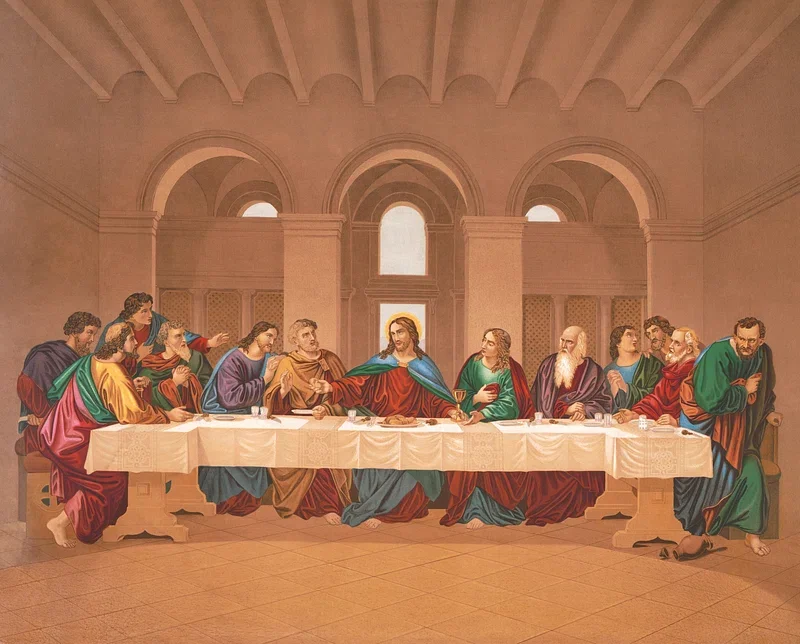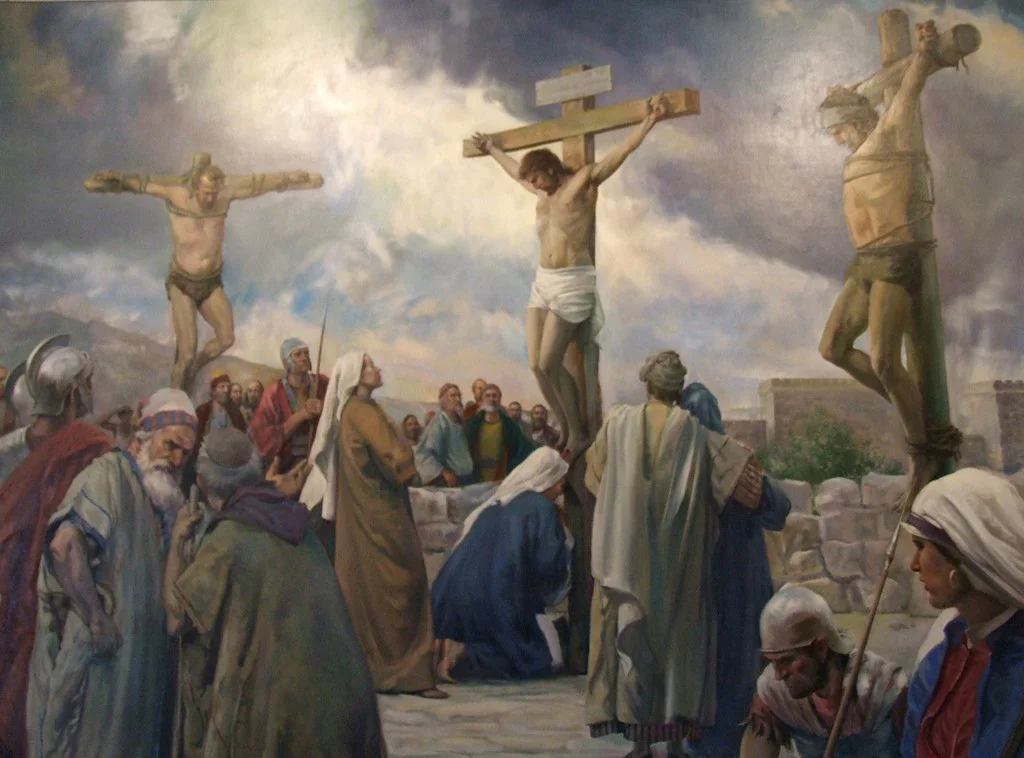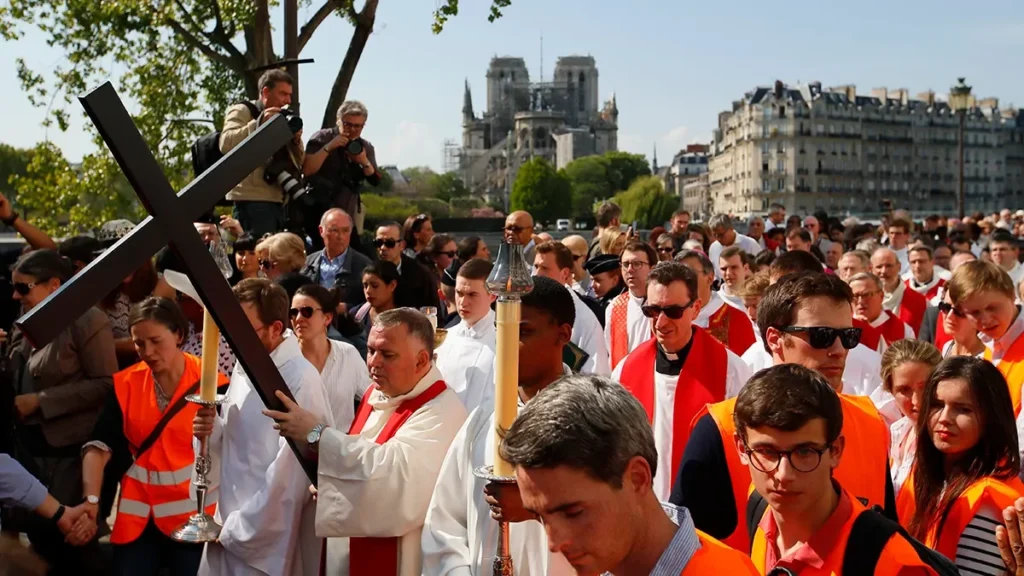
Introduction
Good Friday is a significant day in Christianity, marking the crucifixion of Jesus Christ and his death at Calvary. It falls on the Friday before Easter Sunday and is a time of reflection and solemnity for Christians worldwide. This blog post will delve deeper into the symbolism behind Good Friday, exploring its profound meaning and importance in the Christian faith.
Brief overview of Good Friday
Good Friday commemorates the crucifixion of Jesus Christ and his sacrifice for the sins of humanity. It is a day of mourning and reflection, leading up to the celebration of Easter Sunday. The events of Good Friday are detailed in the Gospels of the Bible, with different perspectives and interpretations.
Importance of Good Friday in Christianity
Good Friday is a cornerstone of Christian belief, symbolizing redemption, sacrifice, and atonement. It represents the pinnacle of Jesus’ earthly livelihood and his final act of sacrifice. The crucifixion and resurrection of Jesus are central to Christian theology, providing hope and salvation for believers.
This blog post aims to uncover the hidden symbolism behind Good Friday, shedding light on its spiritual and theological implications. By exploring the deeper meaning of Good Friday, readers can gain a deeper appreciation for the profound significance of this holy day. Prepare to be amazed as we uncover the layers of symbolism and meaning embedded in the events of Good Friday.
Historical Context
The events leading up to Good Friday
Jesus’ entry into Jerusalem
The origins of Good Friday can be traced to Jesus’ triumphant entry into Jerusalem, where he was welcomed by multitudes who waved palm branches and exclaimed, “Hosanna! Whoever approaches in the name of the Lord is blessed!” This occasion, called Palm Sunday, signaled the start of the last week of Jesus’ earthly mission.
The Last Supper
The Last Supper, a poignant moment in Christian tradition, took place on the evening preceding Good Friday. During this Passover meal with his disciples, Jesus instituted the sacrament of the Eucharist, symbolizing his body and blood given for the forgiveness of sins. He also washed the disciples’ feet, demonstrating humility and servanthood.

Jesus’ arrest in the Garden of Gethsemane
Following the Last Supper, Jesus withdrew to the Garden of Gethsemane to pray, where he experienced deep anguish and sorrow. It was here that Judas Iscariot, one of his disciples, betrayed him with a kiss, leading to Jesus’ arrest by Roman soldiers and temple guards.
Crucifixion in Roman times
Description of the events leading to Jesus’ crucifixion
Jesus’ arrest marked the beginning of a series of trials before Jewish and Roman authorities, including the Sanhedrin and Pontius Pilate. Despite finding no fault in Jesus, Pilate succumbed to pressure from the Jewish leaders and the crowd, ultimately sentencing Jesus to death by crucifixion. Jesus was scourged, mocked, and forced to carry his cross to Golgotha, where he was crucified alongside two criminals. He endured excruciating physical pain and humiliation, yet he spoke words of forgiveness and compassion even in his agony.

Symbolism of the crucifixion in Christianity
The crucifixion of Jesus holds profound symbolism in Christian theology. It is viewed as the ultimate act of love and sacrifice, with Jesus willingly laying down his life to atone for the sins of humanity. The cross, once a symbol of suffering and shame, becomes a symbol of hope, redemption, and victory over sin and death through Jesus’ resurrection.
The impact of Jesus’ sacrifice on believers
For Christians, Jesus’ sacrificial death on the cross is central to their faith. It signifies God’s unfathomable love for humanity and the offer of salvation to all who believe in Jesus as the Son of God and Savior. Jesus’ sacrifice brings forgiveness, reconciliation, and the promise of eternal life to believers, transforming their lives and giving them hope amid the trials of the world.
Theological Significance
Sacrificial Atonement
Jesus’ death as atonement for humanity’s sins
Good Friday holds immense theological significance as it represents Jesus Christ’s sacrificial death on the cross, believed by Christians to be the ultimate atonement for humanity’s sins. According to Christian doctrine, Jesus, being both fully divine and fully human, offered himself as the perfect sacrifice to reconcile humanity with God, bridging the gap created by sin and restoring the broken relationship between humanity and God.
The concept of substitutionary atonement
Central to Christian theology is the concept of substitutionary atonement, which posits that Jesus Christ willingly took upon himself the punishment that humanity deserved for its sins. Jesus, the innocent and sinless Lamb of God, bore the weight of humanity’s guilt and suffered the consequences of sin on behalf of all people, thereby satisfying divine justice and making reconciliation possible.
Redemption and Forgiveness
Jesus’ sacrifice as a means of redemption
Good Friday signifies the redemptive act of Jesus Christ, who offered his life as a ransom for many, redeeming humanity from the power of sin and death. Through his sacrificial death, Jesus achieved victory over sin and secured salvation for all who believe in him, offering the gift of redemption and liberation from bondage to sin.
The forgiveness of sins through Jesus’ death
The death of Jesus Christ on the cross is the ultimate expression of God’s forgiveness and mercy toward humanity. Christians believe that through Jesus’ sacrificial death, sins are forgiven, and the barrier of separation between humanity and God is removed, allowing believers to experience reconciliation with God and the assurance of eternal life.
Love and Salvation
The demonstration of God’s love through Jesus’ sacrifice
Good Friday vividly demonstrates the depth of God’s love for humanity, as expressed through the selfless sacrifice of his Son, Jesus Christ. The willingness of Jesus to endure suffering and death on the cross is seen as the ultimate manifestation of God’s love, surpassing all human understanding and transcending the boundaries of time and space.
The offer of salvation to humanity through belief in Jesus’ sacrifice
Good Friday signifies the culmination of God’s plan of salvation, wherein Jesus’ sacrifice on the cross provides the means for humanity to be reconciled to God and receive the gift of eternal life. By believing in Jesus Christ and accepting his sacrificial death as payment for their sins, individuals can experience salvation and receive the assurance of forgiveness, redemption, and eternal communion with God.
Traditions and Customs of Good Friday
Fasting and Abstinence
Historical and Spiritual Significance
Fasting and abstinence on Good Friday have been practiced by Christians for centuries as a way to honor the sacrifice of Jesus Christ and enter into a period of solemn reflection. By abstaining from certain foods or meals and limiting consumption, believers emulate Jesus’ deprivation and suffering during his crucifixion, demonstrating solidarity with his sacrifice.
Symbolism and Spiritual Discipline
Fasting and abstinence serve as a spiritual discipline, inviting believers to focus their minds and hearts on the significance of Good Friday and the events leading to Jesus’ crucifixion. Through self-denial and sacrifice, Christians seek to deepen their understanding of the meaning of Jesus’ death and cultivate a spirit of humility and repentance.
Attending Church Services
Gathering for Worship and Commemoration
Good Friday is marked by solemn church services held in remembrance of Jesus Christ’s crucifixion and death. Believers gather in churches around the world to participate in special liturgies, readings, and prayers that recount the events of Jesus’ passion and reflect on the significance of his sacrifice.
Observing the Stations of the Cross
Many churches observe the Stations of the Cross, a devotional practice that retraces Jesus’ journey to Calvary, stopping at various stations or stations to reflect on different aspects of his suffering and death. Through this symbolic journey, worshippers meditate on the depth of Jesus’ love and the extent of his sacrifice for humanity.

Observing Moments of Silence and Prayer
Contemplation and Reflection
Good Friday is a day of quiet contemplation and prayerful reflection, during which believers pause to consider the significance of Jesus Christ’s sacrifice. Observing moments of silence allows individuals to enter into a sacred space of introspection, where they can ponder the profound mystery of God’s love revealed through the cross.
Prayer for Forgiveness and Renewal
Prayer is an essential aspect of Good Friday observance, as believers seek forgiveness for their sins and renewal of their commitment to following Christ. Through prayer, Christians express gratitude for Jesus’ sacrifice, seek spiritual strength to endure trials, and intercede for the needs of others, embodying the compassion and mercy exemplified by Jesus on the cross.
The traditions and customs of Good Friday provide opportunities for believers to engage in acts of devotion, self-discipline, and spiritual contemplation as they commemorate the solemnity of Jesus Christ’s crucifixion and death. These practices serve to deepen believers’ faith, foster a sense of unity within the Christian community, and draw individuals closer to the heart of God’s redeeming love.
Reflection and Personal Application
Encouraging Introspection and Meditation
Reflecting on the Significance of Jesus’ Sacrifice
Good Friday invites believers to engage in deep reflection on the profound significance of Jesus Christ’s sacrificial death on the cross. Through introspection, individuals contemplate the extent of Jesus’ love and the magnitude of his sacrifice, pondering the implications of his death for their own lives.
Examining One’s Own Faith and Beliefs
Good Friday serves as an opportune moment for believers to examine their own faith journey and beliefs in light of Jesus’ sacrifice. Individuals may reflect on their commitment to following Christ, their relationship with God, and their response to the call to discipleship, considering how they can live out their faith more authentically in their daily lives.
Embracing the Message of Hope and Renewal
Finding Hope in the Story of Jesus’ Resurrection
While Good Friday is a day of solemn reflection on Jesus’ death, it is inseparably linked to the hope and joy of Easter Sunday, when Christians celebrate Jesus’ resurrection from the dead. Believers find hope in the promise of new life and redemption through Jesus’ triumph over death, affirming their faith in the resurrection as the cornerstone of Christian hope.
Considering the Implications of Good Friday for One’s Own Life
Good Friday prompts individuals to consider the personal implications of Jesus’ sacrifice for their own lives. Believers are challenged to embrace the call to sacrificial love, forgiveness, and selflessness exemplified by Jesus on the cross, seeking to emulate his example in their relationships, actions, and attitudes.
Conclusion & FAQs
Good Friday holds profound importance and significance in the Christian faith, serving as a poignant reminder of Jesus Christ’s sacrificial death for the forgiveness of sins and the reconciliation of humanity with God. As believers reflect on the events of Good Friday, they are encouraged to delve deeper into the Easter story and its implications for their lives. By exploring the themes of redemption, forgiveness, and hope, individuals can deepen their understanding of the transformative power of Jesus’ death and resurrection.
Good Friday continues to hold enduring relevance in the modern world, offering a message of love, redemption, and hope amidst the complexities and challenges of life. As believers commemorate Good Friday each year, they are reminded of the timeless truths and eternal significance of Jesus Christ’s sacrifice, which transcends cultural, geographical, and temporal boundaries.
In conclusion, Good Friday beckons believers to engage in profound reflection, personal introspection, and spiritual renewal as they contemplate the depth of Jesus’ love and the transformative power of his sacrifice on the cross. May this day serve as a sacred opportunity for individuals to draw closer to God and embrace the hope of new life found in Jesus Christ.
Frequently Asked Questions (FAQs)
What is Good Friday and why is it observed?
Good Friday is a Christian religious holiday that commemorates the crucifixion of Jesus Christ and his death at Calvary. It is one of the most solemn days in the Christian calendar and is observed on the Friday before Easter Sunday. Good Friday is observed to reflect on the sacrifice of Jesus, his suffering, and the redemption he provided through his death.
Why is it called “Good” Friday if it marks the day of Jesus’ crucifixion?
The term “Good Friday” is believed to have originated from the old English word “good” meaning holy or pious. Despite commemorating Jesus’ crucifixion, it is considered “good” because it represents the culmination of God’s plan for the salvation of humanity. Christians view Jesus’ death as a necessary sacrifice for the forgiveness of sins and the offer of eternal life, thus considering the day “good” in the context of salvation history.
What are some traditional customs and observances of Good Friday?
Traditional customs and observances of Good Friday include attending church services that focus on Jesus’ passion and death, participating in the Stations of the Cross, fasting, abstaining from meat, and observing moments of silence and prayer. Some communities also hold processions or reenactments of Jesus’ journey to the cross.
Why do Christians fast and abstain from meat on Good Friday?
Fasting and abstaining from meat on Good Friday symbolize solidarity with Jesus’ suffering and sacrifice on the cross. By denying themselves certain foods, Christians enter into a period of solemn reflection and spiritual discipline, recognizing the significance of Jesus’ death for the forgiveness of sins.
How is Good Friday observed in different parts of the world?
Good Friday is observed in various ways across different cultures and Christian denominations. Some communities hold elaborate religious processions or reenactments of Jesus’ passion, while others participate in solemn church services and devotional practices such as the Stations of the Cross. In some regions, Good Friday is also marked by cultural traditions and customs unique to the local context.
Is Good Friday a public holiday?
In many countries with Christian-majority populations, Good Friday is recognized as a public holiday. However, its observance and status as a holiday may vary depending on the country’s religious composition and cultural traditions. In some places, Good Friday may be observed as a bank holiday or a day off from work, allowing individuals to participate in religious services and observances.
